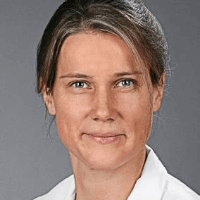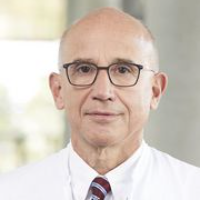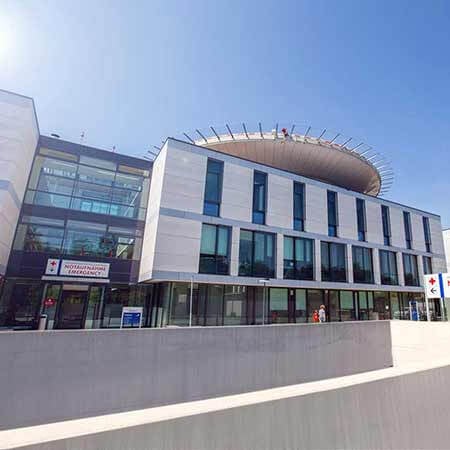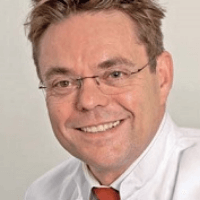Diagnostic of Acute Myeloid Leukemia (AML)
Treatment prices are regulated by national law of the corresponding countries, but can also include additional hospital coefficients. In order to receive the individual cost calculation, please send us the request and medical records.

Department of Hematology and Oncology
The Department of Hematology and Oncology offers the full range of services in these medical fields. It diagnoses and treats all benign and malignant blood diseases, cancers. The huge clinical experience and high competence of the doctors working in the department allow them to achieve excellent treatment results even in the most severe cases.


Department of Hematology, Oncology, Rheumatology, Infectology and Bone Marrow Transplantation
The Department of Hematology, Oncology, Rheumatology, Infectology and Bone Marrow Transplantation offers modern diagnostics and treatment in all areas of its specialization. The medical facility treats patients with solid malignant tumors of various locations, malignant and benign diseases of the hematopoietic system, rheumatic diseases, and infections. The department enjoys a reputation as one of the leading health facilities for bone marrow transplants in Germany, which is confirmed by accreditation in accordance with JACIE standards. More than 80 allogeneic and more than 100 autologous bone marrow transplants are performed in the medical facility annually. In addition, the department successfully carries out innovative CAR T-cell therapy, which is available only in the most advanced medical centers worldwide. The department is part of the Comprehensive Cancer Center Ulm (CCCU), where a multidisciplinary team of highly professional doctors takes care of the health of patients. The high quality of medical services is confirmed by the certification of the German Cancer Society (DKG). The health of patients is in the safe hands of experienced specialists who strive to provide each patient with the most effective treatment using advanced therapeutic methods. The medical facility has 112 beds and many specialized outpatient clinics.







Department of Hematology and Oncology
The Department of Hematology and Oncology offers the full range of diagnostics and treatment of blood diseases, coagulation disorders, oncological diseases and related pathological conditions. The treatment is provided both on an outpatient and inpatient basis. The patient is offered a comprehensive treatment, including intensive care to eliminate side effects associated with the tumor and therapy, development of individual recommendations on nutrition, physiotherapeutic measures and psycho-oncological care.

Acute myeloid leukemia is a prognostically unfavorable disease. It can develop in an adult or child, but older people are more likely to get sick. The average age of the patient is 63 years. The older the person, the higher the risk of developing pathology. The age is also an unfavorable prognostic factor that reduces the success of treatment.
Symptoms
Acute myelogenous leukemia usually does not have specific symptoms, for which this disease could be suspected. However, the developing non-specific signs of the pathological process in the patient usually become the reason for going to the doctor. In the clinic, he will undergo blood tests, and with them the doctor can detect changes characteristic of myeloid leukemia.
The main symptoms of the disease are:
- Weight loss.
- Fatigue.
- Fever.
- Night sweats.
- Decreased appetite.
Due to the impaired bone marrow function, the amount of normal blood cells in the blood decreases over time: red blood cells, white blood cells and platelets. They are responsible respectively for oxygen transport, immunity and blood coagulation. Depending on which disorders prevail, additional symptoms may develop:
- Pale skin, shortness of breath, tachycardia, dizziness, headache.
- Frequent bacterial infections, the formation of abscesses on the skin.
- Skin bruising, nosebleeds, bleeding gums, heavy and prolonged menstruation after puberty.
A large number of pathologically altered, too large white blood cells accumulate in the blood. They do not ensure the functioning of the immune system, but can clog important vessels. This phenomenon is called leukostasis. It develops at a blast cell concentration of 100 thousand in 1 mcl. The result may be shortness of breath, blurred vision, weakness on one side of the body, drowsiness. Such symptoms require emergency medical care. Most of them are associated with oxygen starvation of brain regions.
Other possible symptoms:
- Bone and joint pain.
- Abdominal swelling.
- Development of blood clots in the veins.
- Rash.
- Vomiting.
- Impaired coordination of movements.
- Enlarged lymph nodes.
Early diagnostics
Although there is no screening for acute myelogenous leukemia, its symptoms manifest themselves quite early. A visit to the doctor at the first signs of a serious pathology is the best way to diagnose myeloid leukemia early.
A periodic undergoing of a complete blood count is indicated without the occurrence of any symptoms only to patients at risk for myeloid leukemia. These include:
- Down syndrome.
- Myelodysplastic syndrome.
- Chemotherapy or radiation therapy in a medical history.
Although in this category of patients the risk of disease is higher, most of them do not develop myeloid leukemia.
Establishment of the diagnosis
In the diagnosis of acute myeloid leukemia, the main role is played by laboratory tests, rather than medical imaging methods, as with other malignant processes. The doctor begins by studying the medical history, conducts a physical examination of the patient. Regardless of the reason for the visit to the clinic, everyone is assigned a complete blood count at the initial appointment with the doctor. It can detect impairments. After this, a hematologist will be involved in further diagnostics.
Here are some basic procedures for confirming the diagnosis:
- Bone marrow aspiration.
- Bone marrow biopsy.
Typically, two samples can be obtained simultaneously. The biomaterial is mostly sampled from the pelvic bones, less often it can be obtained from the sternum.
Bone marrow aspiration is suction using a syringe. A biopsy is performed in the second stage. During the study, a thick needle is pressed into the bone. As a result, the doctor receives a column of the pelvic bone and bone marrow, which is subject to histological examination. The procedure can be performed both for the initial diagnostics of the disease, as well as for the further diagnostics for the assessment of the response to ongoing chemotherapy or for the identification of a relapse of the pathology.
Sometimes, liquor can be tested as well. This is rarely done, only if there are signs of damage to the central nervous system.
Changes in the tests
Leukemia can be detected using a routine blood test, whereas the subsequent bone marrow examination has only a clarifying value.
In myeloid leukemia, blood contains few red blood cells and platelets. There are many white blood cells, but they are inferior. These forms of white blood cells are called myeloblasts. They are immature white blood cells, and for this reason they are not able to perform the function of ensuring the normal work of the immune system.
The diagnosis is established through the red bone marrow testing. It is considered confirmed if there are more than 20% blast cells in the sample. Normally, their levels should not exceed 5%, and they should be completely absent in the blood. If blast cell levels in the red bone marrow are more than normal, but less than 20%, the diagnosis can be established using genetic testing.
Additional diagnostic methods:
- Cytochemical study.
- Immunophenotyping.
- Cytogenetic diagnostics.
- Fluorescence hybridization.
- PCR.
The clarifying tests allow the doctors to predict the further development of the disease and better plan treatment.
Although imaging methods are usually not required, some patients may undergo them. If the doctor suspects the presence of a tumor in some organ (spleen, liver, kidney, brain or lymph node), it should be detected.
The diagnostics is performed not only to establish a diagnosis, but also after treatment. The goal of therapy is to achieve remission. A complete remission is when the levels of blast cells in the bone marrow decrease to less than 5%. A molecular remission suggests the inability to detect signs of myeloid leukemia even using PCR (the most sensitive of all tests). With an increase in blast forms in the bone marrow to 5% or more, relapse is detected.
Where can you seek medical help?
You should not necessarily undergo the diagnosis of acute myeloid leukemia in your home country. You may receive better medical care abroad. If medicine is not well developed in your home country or you have to wait for the diagnostics and treatment too long, you can go to one of the best clinics in the world.
The Booking Health company will help you organize your trip. When using our services, you will get a number of benefits:
- We will choose for you a modern German clinic, in which a child or an adult can undergo highly accurate diagnosis of acute myeloid leukemia. This allows you to better plan your treatment.
- Diagnostic financial expenses will be lower up to 50% due to the lack of overpricing and additional coefficients for foreign patients.
- Booking an appointment on the most suitable dates for you.
- Preparation of the program taking into account previously performed diagnostic tests and instrumental diagnostics.
- Establishment of communication with a doctor in the German clinic.
- Monitoring of all stages of the program.
- Control of invoices, return of unspent funds.
- Buying and forwarding of medicines.
- Organization of additional diagnostic procedures or treatment in case of relapse.
- Communication with the clinic after the treatment of acute myeloid leukemia abroad.
The Booking Health company will provide top-class services. We will buy airline tickets for you, book a hotel, meet you at the German airport and deliver to the medical facility by car.

